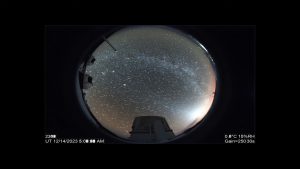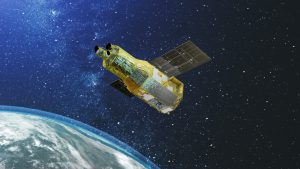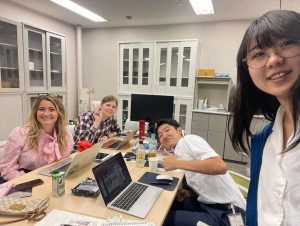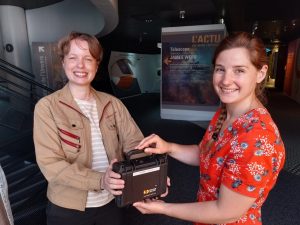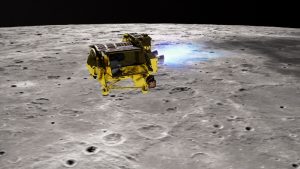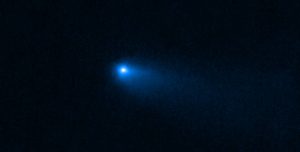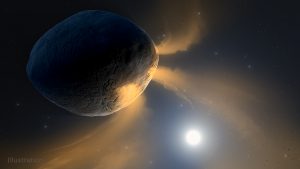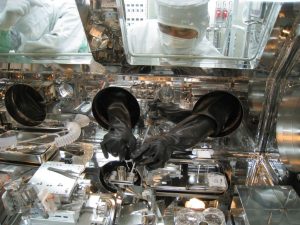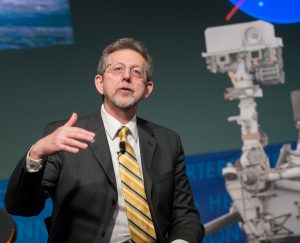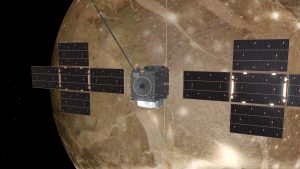
Jim served as a safety diver at Marshall Space Flight Center. (NASA)
“How I got involved in the repair of Hubble is that I’m a scuba diver!”
While studying at the University of Iowa in the late 1970s, Jim Green joined the university scuba club. It was an activity that would ultimately lead to Green being involved in several of the most famous space repairs in history.
In 1980, Green began his first position at NASA at the Marshall Space Flight Center. A short while later, Green was visited by his parents who had asked for a tour of the facilities. The seemingly innocent request sent Green into a fluster.
“A tour! I know what happens in my building, but there’s fifty buildings here. I don’t know what they do! I have no idea what the Marshall Space Flight Center does, what are you talking about?!” laughs Green. “I can show you my pencil and… my computer terminal!”
A clever solution was to assign the task to a more experienced party. Just outside the Marshall Space Flight Center was the US Space and Rocket Center that took visitors on tours of the neighbouring NASA facility. When Green’s parents arrived, the family boarded a bus to take the official tour of Green’s institute.
The tour bus wove through the Marshall Space Flight Center and eventually reached a building that contained a huge tank of water stretching 23m across down to 12m in depth. This was a neutral buoyancy pool where astronauts could practice working in space wearing a full spacesuit while being suspended in the water.
“I look into a porthole and I go, I’ve got to get in this tank!” recalls Green. “How do I get in this tank and dive?”
To support the astronauts during the training exercises, safety and utility divers were needed in the water. And as it happened, many of the current team of divers were retiring that year. With his extensive scuba diving experience in the difficult visibility conditions of the quarries, lakes and rivers of Iowa, Green’s application to join the team was accepted. A few times a week he would then receive a phone call at this desk to dive the next day.
“They’d call me up and say, can you dive tomorrow? I’d look at my schedule, and I’d say great,” remembers Green. “And I’d have a morning dive or an afternoon dive that would last anywhere from 80 minutes to 120 minutes.”
Once in the tank, Green’s job as a safety diver was to weight the astronaut to balance the buoyancy of their spacesuit until they were perfectly suspended in the water. Green would then stay by the astronaut through the exercise to ensure that they were never put at risk.
One such dive was for the spacewalk in 1993 that would fix the flaw in the Hubble Space Telescope’s primary mirror. Yet, the mission Green most clearly remembers was the repair of the Solar Maximum Mission (SMM).
Solar Maximum had launched in February 1980, but a failure in the attitude control late that year sent the satellite into a spin. In 1984, a Shuttle crew intercepted the spacecraft and repaired the fault.
“The repair of SMM was unbelievable!” says Green. “They built the Manned Manoeuvring Unit—the unit that fits on your back, and you literally are the spacecraft—they built that to repair SMM!”
The Manned Manoeuvring Unity (MMU) is the astronaut propulsion pack that is seen in the movie “Gravity” being used by George Clooney’s character. It was the job of NASA astronaut George “Pinky” Nelson to use the MMU to get Solar Maximum safely into the Shuttle’s payload bay where it could be repaired.
“The spacecraft has these solar panels, and it’s spinning,” describes Green. “So Pinky Nelson had to corkscrew his way in, all the way to the satellite itself, and connect. Then he had to use his thrusters to slow the spin down, and pull the spacecraft over to the Shuttle and stick it in the bay. We practiced that in the tank!”
Despite a series of challenges during the mission, Solar Maximum was a successfully repaired. The mission ran for another five years, until the end of 1989.
Green would ultimately perform around 150 dives over five years to support astronauts in the neutral buoyancy tank.
“I had a blast!” he recalls. “We did all kinds of spectacular stuff like this.”
